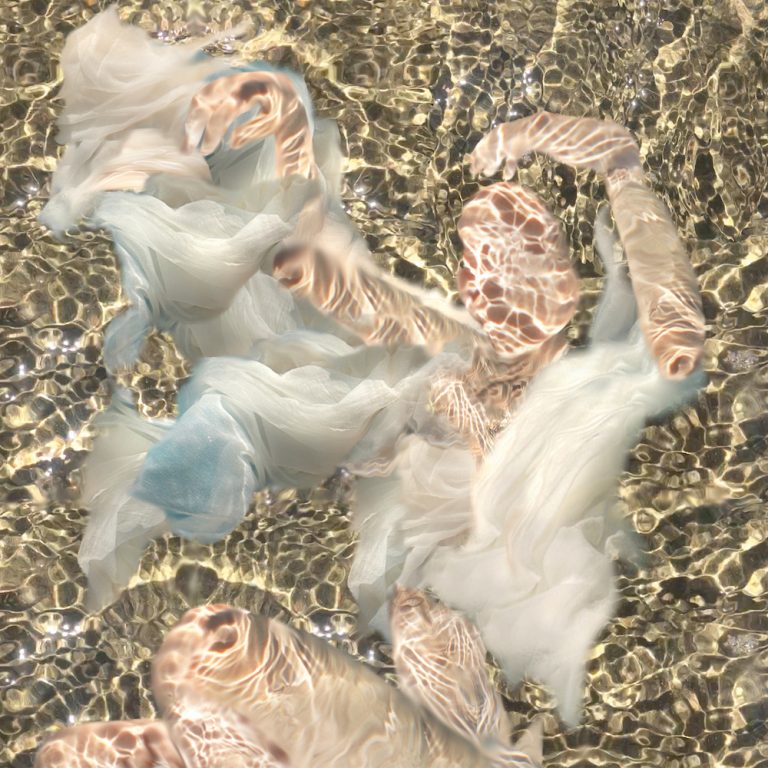Every now and again – however rarely – an artist makes a leap, an evolution, so fully realized and complete that you hardly recognize them from their prior work. Dolphin Midwives (aka Portland-based composer Sage Fisher) has made just that sort of leap.
Liminal Garden, her (massively underheard) 2019 album was already an accomplishment, her harp playing processed into an abstract, largely ambient record. However, whatever it was, it was recognizable and familiar.
That simply ceases to be the case with Body of Water. For the most part, Fisher has left ambient behind in favor of a truly intoxicating, extraordinary, and even alien blend of future pop. Much like its title suggests, this is aquatic music, sounding like it was even recorded through 10 feet of water, her vocals echoing through a distant whirlpool. This sounds like music for some underwater temple, eons from now.
While Fisher is far from the first to blend ambient influences with other arenas of sound, she seems to have worked as if she couldn’t even see the dividing lines between experimental music, pop, neoclassical, and varying shades of electronic. The effect of her expansive approach is like a glancing blow, knocking the listener right out of any sense of expectation they might have had and right into the depths of Fisher’s world, or, rather, worlds, as she drifts between the corporeal and the intangible.
Recorded as the pandemic first began reaching a serious status, the isolation left her disarmed, ensuring she became ever more comfortable with her own voice, which largely takes the center stage here. The emotions unfurling in her often stark verses can’t be ignored, with Sage often layering competing notions across one another’s path. This layering can also be haunting, even frightful, in other moments, such as the skittering “Bloom”, which finds an eerie, twirling repetition of the word “everything,” processed into a strange marine netherworld, clinging to everything, while her more human singing barbs its way over it, making the track beautiful and chilling at once.
None of this is to discount her instrument of choice: the harp is still supremely important to the music of Dolphin Midwives. Indeed, the album drifts seamlessly from its vocally-based future pop into more serene tracks of pure instrumentation, with detours such as “Fountain” and “Idyll” offering something of a bastion from the emotional currents running wild in this aquatic world of loss and mental acrobatics.
Described by Sage herself as “mov[ing] in and out of the physical,” on some level, Body of Water seems to find its creator being lost to its waters, becoming one with them. This is explored as a pure, true desire, on “Clearing” (“let me wash away”), only to be more painfully displayed on “Hummingbird-I”, the first of the album’s two-part stand-out. Here, a repeated, processed uttering of, “I keep shifting in and out of phase,” becomes more and more tragic with each repetition, with Sage gradually layering her proper singing over it: “You can’t see me anymore.” Things don’t seem to improve on “Hummingbird-II” as she continues to utter: “If you try to hold my body… we will die,” with her vocals growing ever more unrecognizable, leaving the impression of her fading completely.
This has been a journey leading to either an ascension or pure nonexistence, a fate largely left up to the listener’s optimism (or lack thereof). As the album draws to a close with “Sunbathing”, we’re not given any easy answers as to just where our guide has ended up, with only the fragile, gorgeous ambiguity of her harp playing remaining.
Still, as challenging as this album may seem in description, quite the contrary is true in listening. Body of Water may be a bizarre, truly idiosyncratic world, but it’s one into which its creator receives listeners with open arms. This aquatic palace is simply meant to be explored. To leave it unexplored isn’t simply a loss, it simply seems unappreciative of the curious tapestry waiting to unfold before your very eyes. It’s the sight of an individual growing beyond their very individuality, becoming one with the waters consuming them, washing away entirely. It’s loss as growth, and growth as loss, and may well leave you questioning the very difference between the two. The ocean blurs everything.


